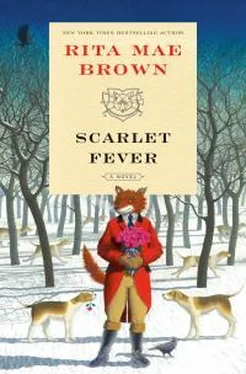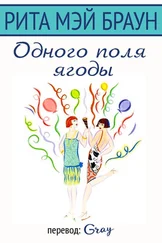Finally Yvonne returned, discovering the jewelry. She had already swooned over the silver and china, as had Sister. Both women evidenced a weakness for table settings. Why, they didn’t really know. They blamed it on their mothers.
Sister stood next to her as Jean pulled out ravishing gold, diamonds, crystals, jewelry from the late nineteenth century through the 1920s, captivating Yvonne.
“The workmanship. Oh, how could I miss that?” She pointed to the fox ring, now back in the case.
Jean pulled it out, saying nothing. Serena Neff had brought it back at the beginning of the week. No foul play seemed to be at issue. Serena couldn’t help it, she wore the ring to Horse Country then slipped it off. That fox ring cast a spell.
“Erté,” Marion stated.
Yvonne knew who Erté was. “Why would anyone part with this? It’s a piece of art.”
“You know, tastes change. And of course, finances change.” Marion placed the ring on a small piece of black velvet on the countertop. “Here.”
Yvonne held out her hand as Marion placed the ring on her third finger, left hand, then noticed the St. Hubert’s ring on her right hand, little finger. “That’s stunning.”
“I hope Saint Hubert protects me. Now, I wouldn’t wear both of these rings at the same time. The fox ring is a nighttime dazzler. Don’t you think?”
“I do,” Marion agreed as Yvonne took it off, placing it on the velvet.
“While I’m here I’d like to buy something for Sam. He’s been so good to me. His chaps are worn.”
“Allow me to suggest you not buy ready-made chaps.” Marion looked into her eyes. “Sam is a professional. He lives in chaps, boots. He needs a pair of chaps made specifically for him. You can’t do better than Chuck Pinell, who has his workshop in your county. Sister will take you there. I could sell you chaps, but really, he needs a custom order.”
Yvonne realized why people remained so loyal to Marion. She could have sold her chaps. She gave her good advice rather than make money off of her.
“Marion, could you suggest something I could purchase from you?”
“How are his paddock boots?”
“Worn to pieces.” Sister now leaned on the counter. “As you know, Betty bought me a new pair for International Women’s Day. So comfortable.”
“All right.” Marion came out again from behind the counter, leading them to the rear of the first floor, where the paddock boots and Italian formal boots were lined up. As the ladies were back there Betty sat on a step, a riser sort of, next to Aunt Daniella. Roni had thoughtfully brought Betty a drink as well.
Sister and Yvonne returned, each with paddock boots, tough ones. Sister liked her boots so much she was buying a second pair. Yvonne and Sister readied to pay their bills. Yvonne bought a tweed jacket for herself and winked, so Jean ran back and picked up the blue one for Aunt Daniella, who wouldn’t know until later. Roni started ringing up the order. Jean was sorting out Sister’s boots as well as a book she had to have, which Jenny found, a Moroccan-bound volume from 1919.
Yvonne, card in hand, paused. “I have to have that ring.”
Sister looked up from her order, she’d pulled a lovely colored stock tie for Betty, which she didn’t want her to see. “Yvonne. Stunning.”
“I have to have it.”
Jean reached for the ring before Roni could, placing it in a velvet ring box. She had tears in her eyes. Then she gave the box to Roni and walked back into Marion’s office.
Marion of course noticed the tears. She knew Jean well.
“It will be beautiful on you.” Marion meant it. “Excuse me. Roni, I’ll be back in a minute.”
Marion walked into her office, where Jean leaned against the desk, tissue in hand.
“I’m sorry,” the blonde woman apologized.
“At least we’ll know where it is. We’ll never know why it was in his pocket.”
Jean simply nodded, wiping her eyes.
Turning to go out to the counter, Marion looked back as Jean pulled herself together.
“Jean, what do you know that I don’t?”
“Nothing,” came the soft but swift reply.
CHAPTER 26
March 24, 2019 Sunday
“Ten.” Betty brought down the back rear door of the old Bronco.
“Small boxes, for which I am grateful.” Sister climbed into the passenger seat. “How many cards in a box?”
“Fifty. And a piece of tissue paper between each card. Then the inside of the boxes have tissue paper. The tissue between the cards covers the card when you send it. Takes time.”
Betty drove into Charlottesville to Water Street. They parked, lights flashing, and before they could reach the door of Taylor Insurance, Drew opened it, walked out to the car. “Don’t worry about a ticket. Sunday. Hardly any traffic. Hello, Sister.”
“Hi, Drew. Your invitations are quite proper. Lovely.” She grabbed a box, as did Betty and Drew.
Walking into the plush office they passed two women, both middle-aged, going out to fetch boxes.
Within five minutes the boxes sat on a long table.
“You ladies are working on Sunday. He’d better be good to you,” Betty joked.
“This is our annual handwritten invitation to clients.” Loretta Giordis sat down, picking up a true fountain pen.
Drew sat down and pulled one out of his pocket. “Dad’s.”
“That pen has to be fifty years old, Drew. It’s a Sheaffer White Dot. I love stuff like that.”
“Betty, you and Bobby recognize anything having to do with papers and pens because of your business.”
“The good stuff lasts, doesn’t it?” Betty noticed Sister staring at the pen in Drew’s hand.
He held it up for her. “Gold tip.”
“Ah, like a Montblanc.” She marveled at the old pen.
“Somewhat. More gold in the Montblancs.” Drew remembered his manners. “Can I get you ladies a drink?”
“Oh, no thank you,” Betty declined. “I wanted to bring the invitations down here in person to thank you again for your business.”
He smiled. “Two years from now the invitations will be printed in gold. How about that? Our seventieth anniversary.”
“Drew, I applaud any business that grows throughout generations.” Betty did, too. “I don’t want to pick up the phone and talk to someone in India or even Dallas. I want to walk into an office and see a neighbor or at least someone who has lived here.”
“Drew, congratulations on your sixty-eighth anniversary. Before we get out of your hair, would you mind if Betty and I drove down the lane to your farm? We haven’t hunted there for years. I need a bit of a reminder.”
“Go ahead. I’m looking forward to it, and the Ticknors will come to the tailgate. It will be like old times.”
“Good times.” Sister smiled.
As the two drove out of town, turning west, Sister inquired, “How expensive is it to print a true invitation? You give us the invitation to Opening Hunt for free. I actually have no idea, which says something about my social life.”
“Three factors. One: the quality and size of the invitation paper. Two: the color of the ink. There is a slight price difference, for some inks are easier to use and clean from the presses once used than others.”
Sister interrupted. “I had no idea.”
Betty smiled. “No reason you should. Kind of the same for people who don’t know much about horses. They don’t realize a horse’s feet must be trimmed even if not shod, those hooves need tending. Okay, third factor: the number of invitations. And there can be a third and a half if it’s a rush job.”
“So a small number of invitations is cheaper? That would make sense.”
“Not necessarily. You actually save money if you leap from, say, seventy-five cards to one hundred. Now, for a wedding invitation or what Drew is doing, celebrating the birthday of Taylor Insurance, that’s not relevant. But let’s say you want Bobby and me to create special hunt club stationery. And you wanted to sell the stationery to club members. It would be cheaper to print up, say, five thousand sheets and envelopes. That sounds like a lot of paper, given there are only one hundred of our true hunting members. Obviously when you factor in the social members, adjacent hunt members, there are more people, but stick to one hundred. It’s easy to figure. So one hundred members buy five hundred sheets apiece. That’s the standard of what you would buy at Staples for a ream of paper.”
Читать дальше












